Corpus Christi Blog
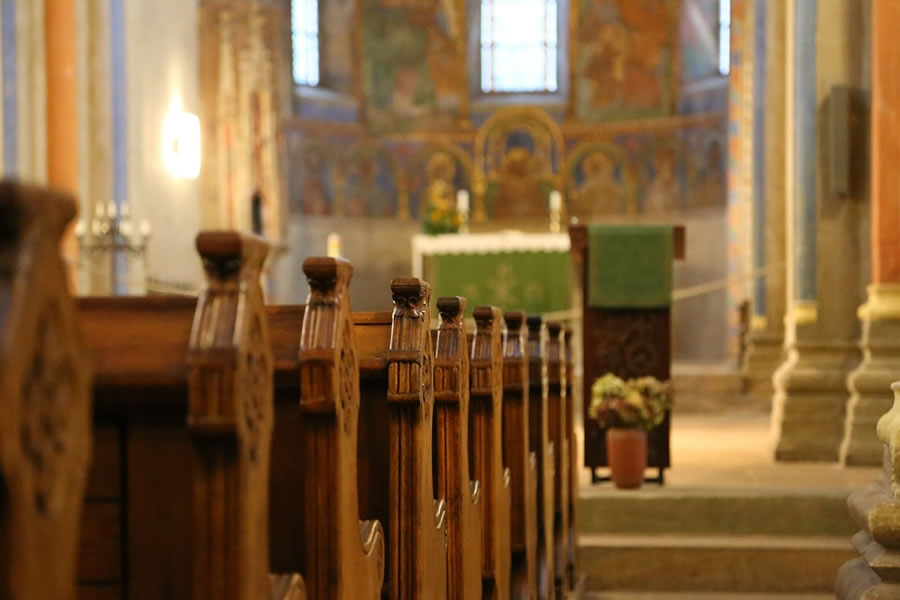
The Precepts of the Church
07-31-2022Weekly ReflectionJen Arnold, M.A. in Theology and CatecheticsHave you ever thought about why the Catholic Church exists or its purpose here on Earth? The short and simple answer is that it exists to lead all souls to heaven. Jesus came to give us a basic blueprint for living and the Church’s job is to provide us the support, guidance, and direction we need for salvation by teaching us the Truth of God’s laws and providing us the sustaining grace we need to follow them through the Sacraments. The Catechism is very strong in its wording saying that, “The faithful therefore have the right to be instructed in the divine saving precepts that purify judgment and, with grace, heal wounded human reason” (CCC #2037).
READ MORE
RCIA
07-24-2022Weekly ReflectionDr. Lenny Kelley, Director of Faith FormationThe RCIA process is a wonderful gift from God. How often do we get to take time and reflect on who we are, what we are made for, who is God, and what life is really all about? If you’re like me, not very often.
For most of us, the busyness of life gets in the way of discovering who we truly are and what we are truly called to be. It is challenging to ask ourselves who God calls us to be when we are trying to figure out how we will afford our rent or braces for our teenager.
READ MORE
Guard Your Eyes to Guard Your Heart and Mind
07-17-2022Weekly ReflectionJen Arnold, M.A. in Theology and CatecheticsAs a catechist, certain topics are easier to discuss than others. However, we live in a fallen world and the spiritual battles that are raging around us are only fueled by us turning a blind eye to certain plagues in our society. I recently heard that there is one sin that priests hear in the confessional more than any other sin: engagement with pornography. If, out of every possible sin, pornography is, by far, the most prevalent, it means that many more people are struggling with it than we know. With this in mind, I have decided to tackle this difficult topic.
READ MORE
Joy
07-10-2022Weekly ReflectionJen Arnold, M.A. in Theology and CatecheticsWe live in a world today that encourages us to seek personal happiness at every turn. We are told to “do what makes you happy” without considering the consequences. We are told to be happy for others when they seek and find what makes them happy. We say we want our children to be happy. We are assaulted with constant messaging about the things and circumstances that will make us happy: If I get a promotion, I will be happy; If my spouse was more attentive, I would be happy; If I can save enough money for that vacation, I will be happy; If I lose weight, I will be happy; and the list goes on.
READ MORE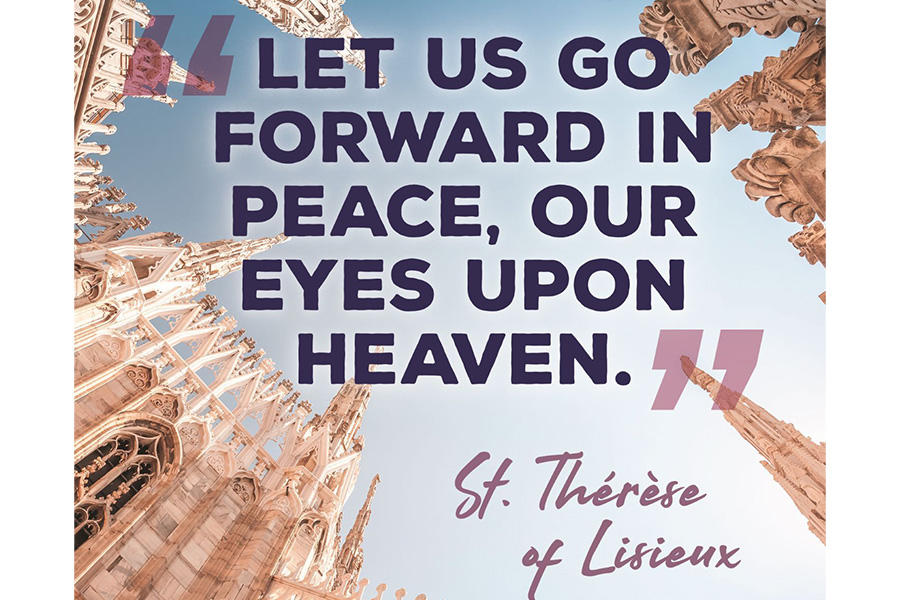
Eschatology-The Last Things
07-03-2022Weekly ReflectionJen Arnold, M.A. in Theology and CatecheticsThis week, we will take a look at a particular branch of theology called Eschatology (pronounced: “ess-ka-Tall-oh-jee”). The root of eschatology is the Greek word eschaton which means “last.” Eschatology is the study of the last things: death, judgement, heaven, purgatory, and hell. The Catholic Church is eschatological in nature because her entire earthly mission is to effectively prepare souls for these last things, so that as many people as possible may get to heaven. Every single individual Church teaching finds its origin in what is needed for each person’s eschatological end. Since dying is inevitable for each of us, it is in our best interest to pay attention to how following Church teaching leads us to heaven, while ignoring certain things can potentially lead us on a path to eternal destruction.
READ MORE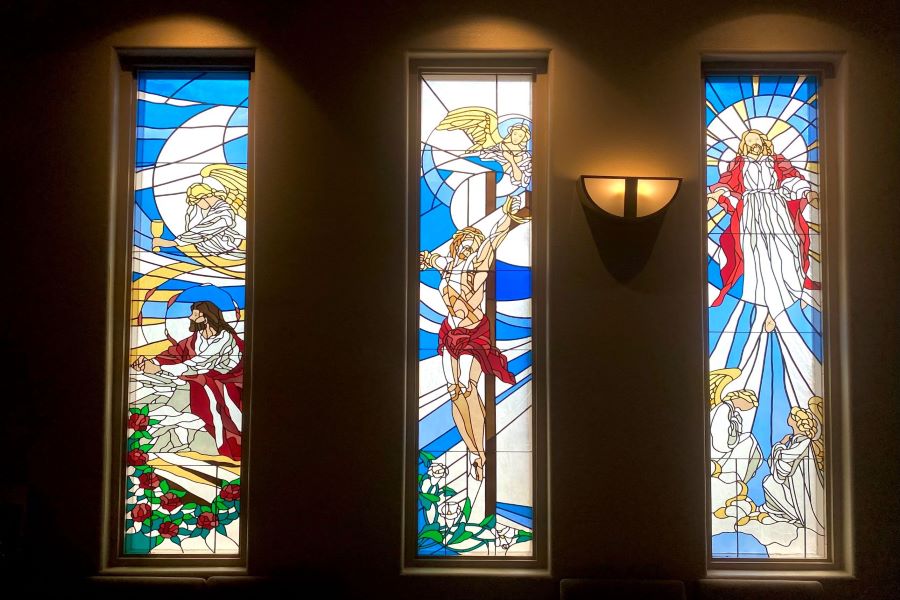
A Picture is Worth a Thousand Words, Part 2
06-26-2022Weekly ReflectionKathleen Foley, Director of Mission AdvancementAs we continue to celebrate the 25th anniversary of the dedication of our church, we will take a look at the remaining stained-glass windows to further help us connect the visual to the spiritual.
READ MORE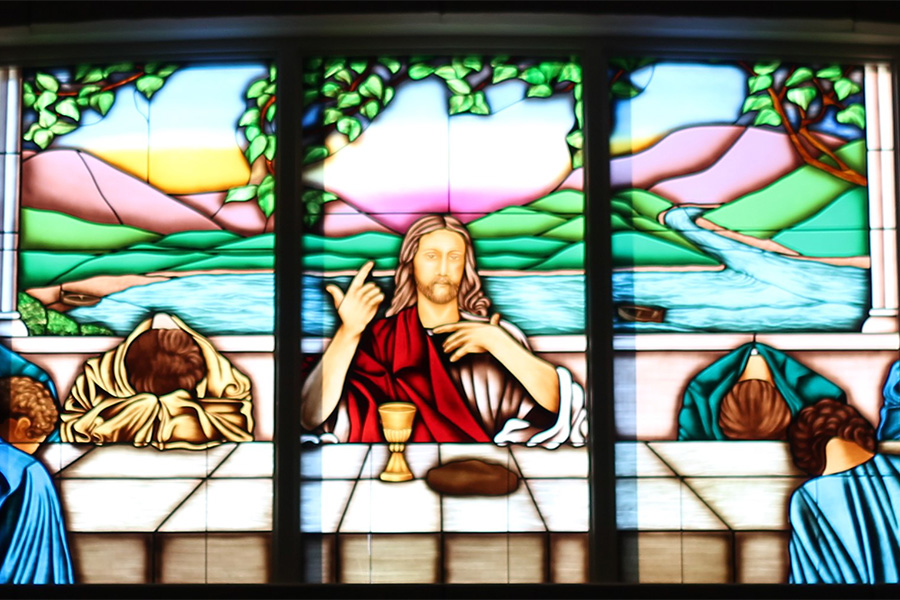
A Picture is Worth a Thousand Words, Part 1
06-19-2022Weekly ReflectionKathleen Foley, Director of Mission AdvancementStained glass has been an amazing artform since ancient times. As early as the 7th century, craftsmen began including stained-glass windows in Catholic churches. Since the vast majority of the population was illiterate, the windows included details from stories in the Bible. Imagine the truth and beauty of hearing the Scripture readings at Mass and then looking up at a window depicting the story as the sunlight streams through as if to highlight the listener’s understanding. Perhaps while praying the rosary, one could gaze upward to a window featuring one of the mysteries. Stained-glass windows in churches serve many beautiful purposes!
READ MORE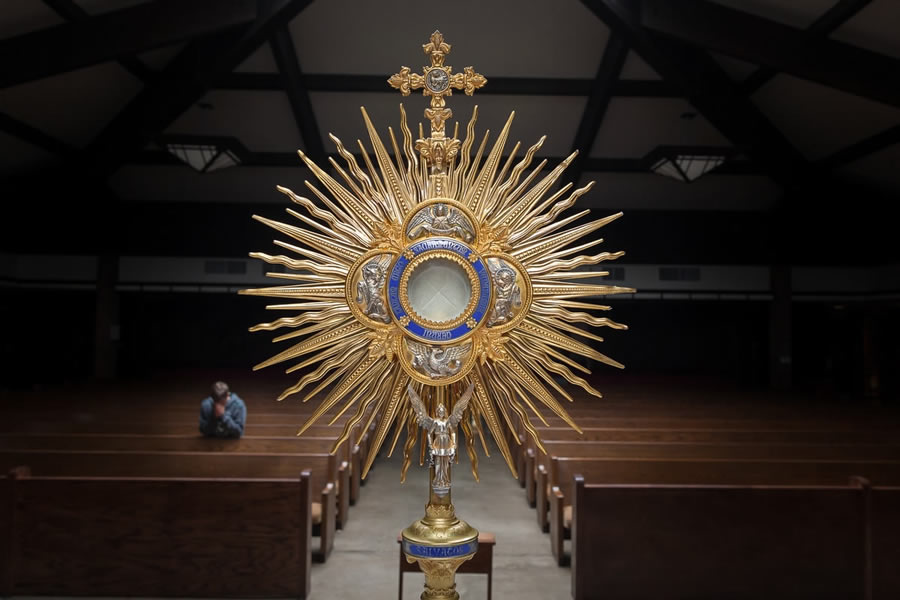
The History of the Feast of Corpus Christi
06-12-2022Weekly ReflectionKathleen Foley, Director of Mission AdvancementThis year marks the 758th celebration of the Feast of Corpus Christi (Latin for “Body of Christ”) – also known as the Solemnity of the Most Holy Body and Blood of Christ. Since this is our parish feast day, which we’ll celebrate next Sunday, it’s helpful to know the history of this special day.
READ MORE
Pentecost
06-05-2022Weekly ReflectionJen Arnold, M.A. in Theology and CatecheticsToday, we celebrate the birthday of the Catholic Church on the feast of Pentecost. As Jesus’ time here on earth was coming to a close, He promised He would not leave us alone.
If you love me, you will keep my commandments. And I will ask the Father, and he will give you another Helper, to be with you forever, even the Spirit of truth, whom the world cannot receive, because it neither sees him nor knows him. You know him, for he dwells with you and will be in you. (John 14:15-17)
READ MOREThis week, we will take a look at a particular branch of theology called Eschatology (pronounced: “ess-ka-Tall-oh-jee”). The root of eschatology is the Greek word eschaton which means “last.” Eschatology is the study of the last things: death, judgement, heaven, purgatory, and hell. The Catholic Church is eschatological in nature because her entire earthly mission is to effectively prepare souls for these last things, so that as many people as possible may get to heaven. Every single individual Church teaching finds its origin in what is needed for each person’s eschatological end. Since dying is inevitable for each of us, it is in our best interest to pay attention to how following Church teaching leads us to heaven, while ignoring certain things can potentially lead us on a path to eternal destruction.
READ MORE